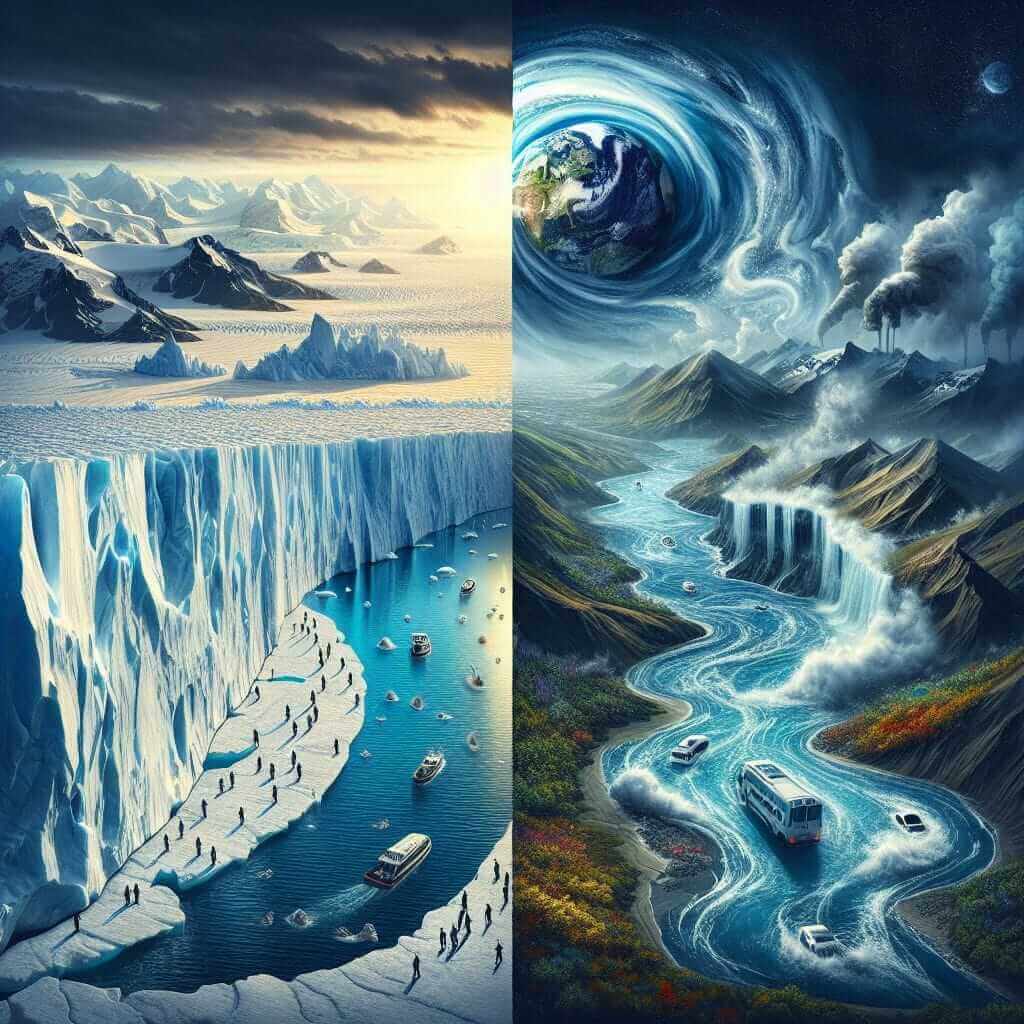The IELTS Reading section tests your ability to comprehend and analyze various text types under time constraints. One recurring theme that you should be familiar with is climate change, which is a current and pertinent topic. This article delves deep into the “Effects of climate change on water systems,” reflecting its importance and likelihood of appearing in your IELTS exam. Understanding and practicing with this topic will equip you with the knowledge and skills to tackle similar texts effectively.
The Reading Passage: Effects of Climate Change on Water Systems
Reading Passage
Climate change is having a profound impact on water systems worldwide. As atmospheric temperatures rise due to increased greenhouse gas emissions, glaciers and polar ice caps are melting at unprecedented rates, leading to rising sea levels. This has multifaceted effects on both freshwater systems and marine environments.
One of the most significant impacts of climate change on water systems is the alteration of the hydrological cycle. Increased evaporation and changes in precipitation patterns lead to more intense and frequent droughts in some regions while causing severe flooding in others. Such extreme weather events can have devastating effects on water quality and availability.
Apart from the physical changes, the warming temperatures also affect aquatic ecosystems. Many freshwater species are sensitive to temperature variations and may struggle to survive as water temperatures rise. This can lead to shifts in species distribution, population declines, or even extinction. Additionally, the increases in water temperature accelerate the growth of harmful algal blooms, which contaminate water supplies and pose health risks to humans and wildlife.
Moreover, climate change exacerbates water scarcity issues. As the demand for water increases due to population growth and industrial activities, the shrinking water resources cannot meet the needs. This competition for water can lead to conflicts among communities, agricultural sectors, and nations, amplifying socio-economic challenges.
Shortage of clean water also impacts agriculture, reducing crop yields and stressing food security. Farmers in arid regions face the brunt as they rely heavily on predictable water supplies for irrigation. The depletion of groundwater reserves and reduced river flow further complicates efficient water management.
Overall, the effects of climate change on water systems are complex and multifaceted, requiring collaborative efforts and innovative solutions to mitigate the impacts and adapt to new hydrological realities.
Questions
Multiple Choice
-
Which of the following is a significant consequence of climate change on water systems?
A. Increased soil fertility
B. Melting glaciers and rising sea levels
C. Decreased atmospheric pollution
D. Reduced weather variability -
How do rising temperatures impact aquatic ecosystems?
A. They improve fish breeding conditions
B. They lead to increased freshwater supplies
C. They promote the survival of all species
D. They cause harmful algal blooms
True/False/Not Given
- Climate change causes more frequent and intense snowfalls. – True/False/Not Given
- Competition for water due to shrinking resources can lead to conflicts. – True/False/Not Given
Matching Information
- Match the following statements with the correct paragraphs:
- _____: Increased water temperature accelerates algal growth and contaminates supplies.
- _____: Climate change leads to changes in precipitation patterns.
Summary Completion
Complete the summary below using words from the text:
Climate change affects the hydrological cycle, leading to more frequent and severe . The rise in water temperature not only impacts aquatic ecosystems but also promotes the growth of . Additionally, water scarcity issues are worsened due to increased and industrial activities.
Answers
Multiple Choice
- B. Melting glaciers and rising sea levels
- D. They cause harmful algal blooms
True/False/Not Given
- False – The passage discusses increased evaporation and changes in precipitation patterns, not snowfalls.
- True – The passage mentions that competition for water resources due to scarcity can lead to conflicts.
Matching Information
- D: Increased water temperature accelerates algal growth and contaminates supplies.
- B: Climate change leads to changes in precipitation patterns.
Summary Completion
Climate change affects the hydrological cycle, leading to more frequent droughts and severe flooding. The rise in water temperature not only impacts aquatic ecosystems but also promotes the growth of harmful algal blooms. Additionally, water scarcity issues are worsened due to increased population growth and industrial activities.
Common Mistakes to Avoid
- Misreading Keywords: Ensure you understand the question by identifying and focusing on keywords. Misreading can lead to selecting incorrect answers.
- Overlooking Context: Sometimes, answers are buried in the context rather than being directly stated. Pay attention to the overall paragraph, not just the sentence.
- Assuming Information: Do not let outside knowledge influence your answers. Stick strictly to the information given in the text.
Vocabulary
- Hydrological cycle (noun): The process involving the circulation of water in various forms in the atmosphere and the surface of the Earth.
- Intense (adjective): Extreme in degree or strength.
- Algal blooms (noun): Rapid increase or accumulation of algae in water systems.
- Scarcity (noun): The state of being in short supply.
- Mitigate (verb): To make less severe, serious, or painful.
Grammar Point
Passive Voice
Passive voice is frequently used in academic texts to emphasize the action rather than the subject performing the action. For example:
- “Glaciers are being melted by rising temperatures.”
Structure: Subject + [to be] + past participle (+ by the doer)
Example: The water cycle is disrupted by climate change.
Conclusion
Understanding and practicing reading passages on the “Effects of climate change on water systems” is vital for excelling in the IELTS Reading section. Pay close attention to common pitfalls, enhance your vocabulary, and practice regularly to achieve high scores.

For further reading on related topics, you might find the articles on technological solutions to water scarcity and economic effects of climate adaptation strategies insightful.